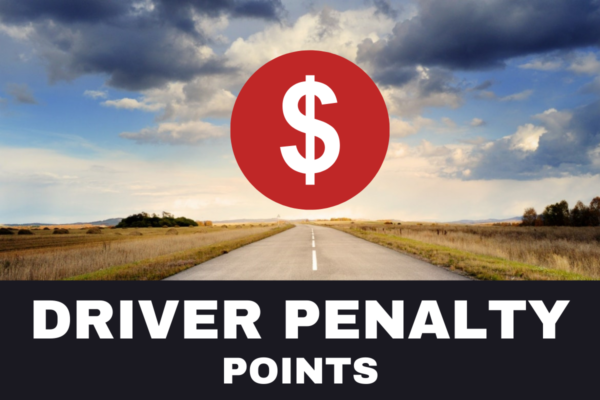Welcome to How ICBC Points Work
In short, how ICBC points work by adding extra fees onto a driver’s record after driving offenses or crashes. These can add up to terribly large amounts of money on your driving record if you are found not to be behaving. For a related article, check out British Columbia Driver’s License & Vehicle Guide.
- Four points will cost $252
- 50 points will cost $34,560… (not even kidding)

What Are ICBC Points?
At first, “points” may almost sound like a good thing. But they’re definitely not. ICBC points are given to drivers who basically get into some kind of trouble with ICBC. ICBC points = extra ICBC bills. In other words, paying ICBC even more money than you already are.
Points are given to drivers who are found to have:
- Driving offenses (speeding ticket, failing to yield)
- Driving convictions (convicted of speeding ticket, failing to yield)
- Crashes
If you get points added to your driving record, you could receive a bill for what is known as a driver premium. ICBC has two driver premium programs. These are both assessed annually. These are known as:
- The Driver Penalty Points Premium
- The Driver Risk Premium
How ICBC Points Work
ICBC Points, also known as Driver Penalty Points, are added to your driving record if you get traffic offenses, such as speeding tickets. ICBC has a list of many traffic violations and tickets on its website.
If you’re in the graduated licensing program (you have your L or N), you’ll need to make sure you’re following all of your restrictions so you don’t get into trouble by carrying the wrong type of passenger, or too many passengers, for example. Check out my full article ICBC L&N Driver Restrictions – Summary and Bottomless FAQ to get all of the details.
The different offenses can have different numbers of points attached to them
For example:
- A typical speeding ticket is worth 3 points
- Using an electronic device while driving is worth 4 points
- Failing to yield to a pedestrian is worth 2 points
- Driving without due care is worth 6 points
ICBC looks at your driving record once per year (once per 12-month period) if you have received any points. They add up the total number of points on your record.
It’s important to note that this one-year period might include offenses from a previous period that have recently been added to your record. ICBC calls this period the “assessment period.”
If you have collected more than three points (in other words, if you have 4 points or more on your driving record), then you will have to pay what’s known as a DPP or Driver Penalty Point Premium. In other words, extra fees.
Obviously, the more points you have, the more money you’ll have to pay ICBC in Driver Penalty Point Premiums. And if you’re in the graduated licensing program, your file may be sent to the superintendent of motor vehicles for review, which is never a good thing and can result in prohibition or other penalties. Check out my article New Driver Speeding, Tickets, Prohibitions, Penalties BC to learn more about that.
DPP Premiums Are Attached To Your Record
It’s important to note that these Driver Penalty Point (DPP) Premiums are attached to your driving record. These are completely separate from your ICBC Autoplan insurance premiums.
This means you will still receive a bill for these points, even if you don’t own a car or buy a car insurance policy with ICBC. Basically, there is no way to escape these points.
Points Affecting ICBC Insurance Coverage
ICBC has recently (2019) made some changes to its insurance rate model. Convictions for serious or frequent driving offenses that happened on or after June 10, 2019, may be factored into your insurance costs. Specifically, into your Collision and Extended Third Party Liability Coverage. Read the ICBC news release here.
Serious offenses will result in increased insurance premiums after the first conviction. Examples are:
- Criminal Code offenses
- Impaired driving offenses (drugs & alcohol)
- Excessive speeding offenses
- Distracted driving offenses (emailing or texting while driving)
Smaller offenses like failing to stop, failing to yield, speeding, or not wearing your seatbelt will only translate into increased insurance premiums if there are two or more convictions during the scan period.
So, in more ways than one (insurance premiums & and driver points), everyone can maybe kind of afford to get one typical speeding ticket per year. After that, it’s going to get expensive very quickly.
How ICBC Points Work – Speeding Ticket Example

Let’s use the typical speeding ticket as an example.
- One speeding ticket costs $138-$196 and 3 points. 3 points are worth $0, but you’ll still have 3 points on your record, sitting there, waiting to morph into more points. So the total cost of one speeding ticket will be $138-$196.
- Let’s say you get two speeding tickets within a year (the 12-month assessment period). The total cost of the speeding tickets will be then $276-$392, but because each speeding ticket is worth 3 points, you’ll now have 6 points on your record. And 6 points just by themselves are going to cost $432, according to ICBC’s Driver Penalty Point Premium Chart. So, all of a sudden your total cost for the 6 points and the two speeding tickets will be $708-$824. Ouch.
How ICBC Points Work – Texting While Driving Example

Let’s use a texting and driving ticket example.
- One ticket for texting and driving will cost $368. It comes with 4 points. 4 points cost $252. So, the total of one texting and driving ticket with its 4 points will be a grand total of $620.
- Two tickets for texting and driving within the same 12-month period will be $736 plus the cost of 8 points (which isn’t just $252 + $252 by the way; it’s $749! See chart). So the grand total of two texting and driving tickets with their 8 points will be $1485.
How Long Do Points Stay On Your License in BC?
All ICBC prohibition points, suspension points, and/or penalty points stay on your driving record for five years in BC. There is no way to pay to remove them faster. If you need to get a copy of your driving records, check out my article ICBC Driver’s Abstract Online.
Will 3 Points Affect My Insurance BC?
No. Minor offenses like speeding tickets, not wearing a seatbelt, or failing to yield will only result in increased insurance premiums if there are two or more convictions during a three-year period. Check out the ICBC Fact Sheet.
How ICBC Points Work – The Driver Risk Premium

The Driver Risk Premium is another program for people to pay additional penalties when they get into extra amounts of trouble with ICBC, such as:
- One or more driving-related Criminal Code convictions
- One or more 10-point Motor Vehicle Act convictions (examples: driving while prohibited, driving while suspended)
- One or more excessive speeding convictions
- Two or more roadside suspensions or prohibitions
- Two or more convictions over a three-year period for using an electronic device while driving
Some offenses or convictions (like excessive speeding) may apply to both the Driver Penalty Point program and the Driver Risk Premium. If this happens to you, ICBC will bill you once per year under whichever program results in a higher premium.
Conclusion
Hopefully, this has answered your question about how ICBC points work. ICBC points are additional fees that are added on top of the cost of fines and tickets, such as speeding tickets. They’re also used for many different driving convictions and collisions. Basically, the more tickets you get, the more added fees (points) you’ll get attached to your driving record, too.
These points seem to be structured in a rather exponential, not linear, sort of way. Since having 3 points on your driving record costs $0 by themselves, most people can kind of afford to get one speeding ticket (or one basic ticket) per year. Anything more than that is going to add up very quickly in points.
This is all, of course, meant to inspire people to behave while on our beautiful British Columbia roads. Not sure about you but it inspires me to behave, for sure.




Hi,
I’m grateful if you can answer my question below.
If I got 5 points on my record, do I pay $282 each year for 5 years?
You would just pay the fee once but it would show on your record for 5 years, unless you have any of the following:
One or more driving-related Criminal Code convictions
One or more 10-point Motor Vehicle Act convictions (examples: driving while prohibited, driving while suspended)
One or more excessive speeding convictions
Two or more roadside suspensions or prohibitions
Two or more convictions over a three-year period for using an electronic device while driving